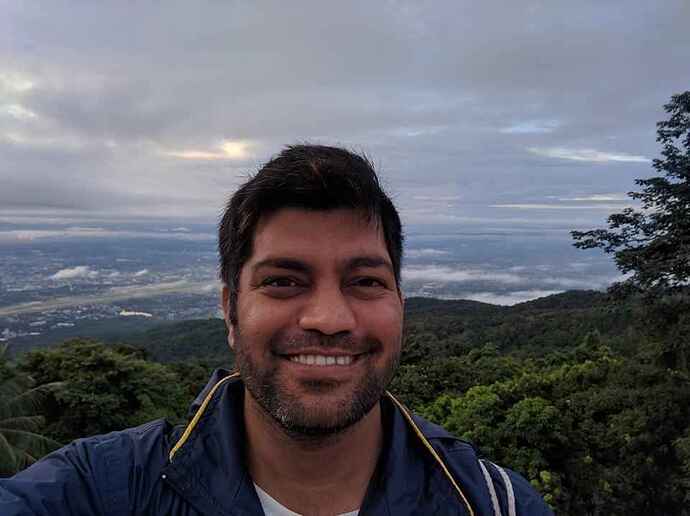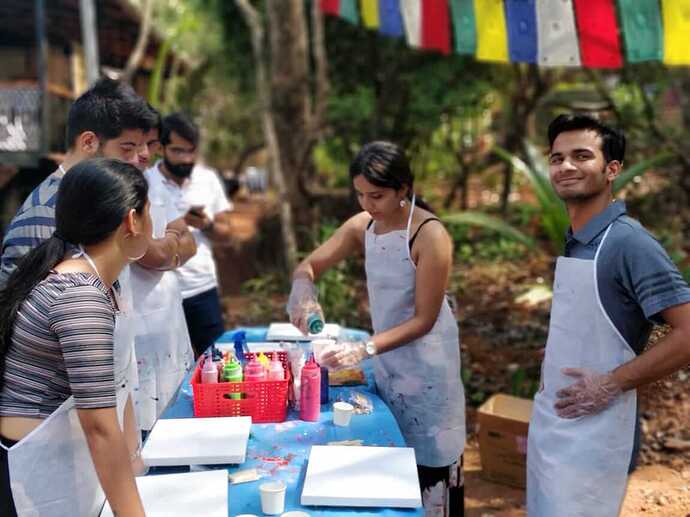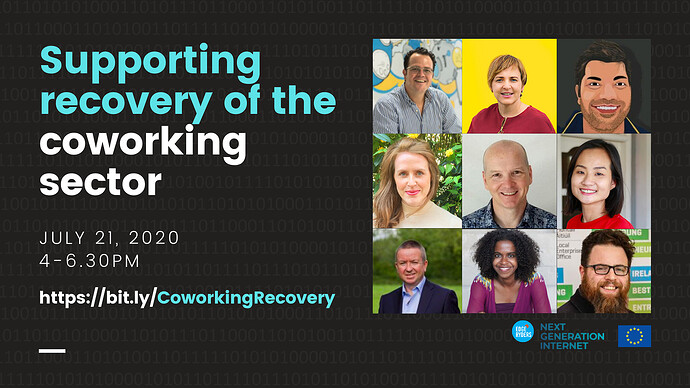A summary of this post can be found here: Mayur Sontakke - Founder at NomadGao Remote Coliving & Startup advisor
Hello,
I’m Mayur Sontakke. I’m a financial analyst, I started working remotely back in 2014 for a American startup, and because I had the flexibility I spent three, four years traveling within India and Southeast Asia which gave me perspective on the coworking as a concept, because I probably visited 50 or 64 coworking spaces over the span of three, four years.
I advised some coworking coliving companies on their expansion, on their strategy, and also the government of Goa on making Goa more popular among digital nomads. All of my experience came together, and I started a coworking coliving place in Goa last year called NomadGao. It’s in a village not too far from the beach.
I did a lot of research on what people are looking for, what sort of people travel and live in coliving places, or work from coworking spaces, apart from the the first-hand experience that I have had being the coworker myself.
We are a small space. We have about 15 to 20 coworking seats, five or six rooms. It’s fairly manageable without technology. Our focus has been more on human interaction, but once we ended up having double bookings from different platforms, then we said, “Okay, technologically is a must,” even though the scale is small. In fact, the small scale helped us in experimenting with technologies and see what works best.
We use Cobot for the coworking space management, which makes it easy for our customers to sign up and to pay. For the coliving, we are listed on Airbnb. We also are on our own platform. We use general manager, Cloudbeds, which helps us make sure that double bookings won’t happen. The rates and everything goes to different tenants smoothly.
We use social media extensively because we are a new space. We are developing the digital nomad scene in Goa, we are actually promoting Goa, and then promoting that space.
For the coworking space management, we’ve tried two or three different softwares. We could do that because most of our members are in house. We just need a software that takes care of messaging eight to ten people. When something goes wrong, it’s much easier to talk to our customers and apologize, and make sure that we break the ice. When I talk about experimentation, I think it’s more about making sure that our customers are okay with the new things we are trying. I think that would be much harder to do in bigger spaces.
We were in lockdown for over two months, which gave us a lot of time for thinking about how we really want the systems to be. For example, we had separate systems for coworking, coliving, and accounting, so we did a lot of manual work fetching bookings from the booking platform, putting them in that concrete system, or fetching bookings from Cobot and putting them in that concrete system. Now we use Zapier to integrate all these products.
In COVID, we are focusing more on automating because I feel that humans need not spend their time in things that can be automated easily. People who are working with me and my team should be focusing more on building the community, or focusing on making sure that everybody here is happy, or should focus on connecting people with each other to drive synergies or collaborations.
In terms of community, I think people are spending longer time here because either they’re locked down or didn’t want to be in big cities in India, so they came over to Goa and they’re working from our space. The biggest change is the demographics. Earlier we had 80% expats, or foreigners, or non-Indian digital nomads. But now that borders are closed and flights are not operating, we have seen that demographic change. A lot of Indian companies going remote, lot of Indian companies opting to give work to freelancers, we’ll see a lot of Indians coming here.
Cobot takes care of our accounting and allows us to have a public community directory so that people can talk to each other, and then meet. For example, if a new member comes in who needs a designer, and if we have had a designer in the past, it’s much easier to connect directly through Cobot member directory. It also gives us some insights about member demographics to focus our marketing efforts, or to focus on overall strategy. It also allows access control, but we haven’t done that so far because, again, it’s a matter of scale.
I’m quite excited about the future. A lot of Indian companies are approaching us. So far we were focused solely on digital nomads, but now we are getting a lot of artists who want a break from big cities who stay with us. The enterprise part is going to grow because companies will need places for offline retreats, or they will need offices in exotic destinations.
I feel that government should be more in this, because policies matter. For example, when you focus on digital nomads, the visa situation is a gray area where there is no visa for digital nomads. Now Estonia is doing it, or Thailand is doing smart visa, but unless government gets involved, there won’t be a legitimacy to digital nomads.
The government also needs to focus on building the ecosystem. Not just spaces, but then encouraging internet service providers to invest and have better networks at such places, or creating some basic facilities. For example, I consulted Goa government on attracting digital nomads back in 2018. Goa is a great place. We are most welcome to come over here, but, it lacks certain basic things. I think government can help in getting all that basic ecosystem in place.
Some of the Indian governments are acting on this. There is a local government in the state of Kerala that is asking people to convince their employers to give them remote work, and then setting up coworking infrastructure so that people can actually work from places in the state. The government of India has also launched its own work from home program where people will have to work from home for at least 15 days in a year. Some of the public sector organizations are launching their own work from home programs. I think over time we’ll see government getting more active into this space, building own coworking spaces for their own employees, or employees of other public sector companies.
The biggest challenge is using this form of remote work to have a distributed world, a more equal world. We have this very beautiful tool for remote work to make it happen.nIf coworking spaces sprout in tier two, tier three cities or rural areas of India, it would be a great equalizer. I read a interesting piece about a company, a unicorn company, in India, whose founder works from a village. They’re building offices, small offices in different villages, so that people who belong to nearby villages can work on there so they don’t have to commute or move to a bigger city. I think technology can play a great role in this. It all starts with having the basic internet infrastructure for all. If it is spread out well, if all the areas, the rural or urban, get the same internet connectivity, it’s much easier to make the reverse shift happen.
We are also working on a social program.The idea is to have volunteers who have remote jobs or remote work who go to villages, spend three months, six months there, spend a couple of hours a day in educating the rural population on using technology. Then also learning sustainable ways of living or farming, to bridge this urban-rural gap. I feel, yeah, the next big challenge is to bridge the gap, and maybe there’s, then, equality. Program Panchayat is the first initiative right now. We run skill share programs. We try to integrate the local community into what we are doing. We plan to continue that in different places over the next couple of years.
Most of our members come for a month, they end up being here for three months because they love the space and they love this family. In terms of skill share, actually our community members actively share what they know, share their own skills. We record them, put them on YouTube. We sometimes invite locals to come over for the skill shares. In terms of integration between coworking, coliving, skill share and everything else that we are doing, I think that we are quite integrated. Our community does all of this.
Now we are adding community manager, hopefully in the next month or two, so that we can focus on the social mosaic, or to really take this model and expand. We don’t use technology in onboarding, because I feel that what sets us apart is the family feel, the warmth. We walk around, show them around, and give them some tips. Eventually maybe we’ll have to automate some of it through technology, but right now it’s just manual.
The best thing that could happen is we build something to make India popular for digital nomads. I’ve been working towards it for the last four years. I feel the stage is set to make that happen, we just need to be consistent.
So far coworking in India was just the urban coworking, find which coworking spaces in big cities, but I think that model is going to change now. With population getting this to move there, with a lot of people going at remote work. Coworking would not be just about real estate. It’s not a real estate business anymore, because with social distancing and all, all of the economics of coworking have changed. You’ll probably have to bring in less the number of people in the space that you … At least for some amount considering moving by a number of people. I think now it’s time to focus on building the human connection rather than building the space. We are trying to do that here.
Meet Mayur at our event on 21/7. Registration is free of charge. To get your ticket, just post a thoughtful comment here to help drive the thinking and learning forward and we will send you the access code. Did you sign up via eventbrite? We ask that you too contribute to the conversation here ahead of the event to ensure everyone is on the same page, better networking etc. More info.


